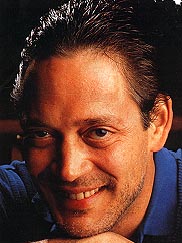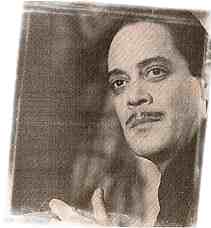|
Para ver este documento
en español, oprima aquí.
Puerto Rico Profile: Raul Julia
February 11, 2000
Copyright © 2000 THE PUERTO RICO HERALD. All Rights Reserved.
 Renowned child psychologist
Erik Erickson once said that our lives are the fulfillment of
our parents' dreams. Renowned child psychologist
Erik Erickson once said that our lives are the fulfillment of
our parents' dreams.
Raul Julia's father dreamed of bringing pizza to Puerto Rico.
In fact, his father made that dream a reality when he added pizza
to the menu at "La Cueva del Chicken Inn," his oddly
named restaurant in San Juan. His son later hailed that pizza
as "the best you've ever eaten."
The success of La Cueva del Chicken ("The Chicken's Cave")
provided Raul Julia with more than good pizza. It paved the way
for him to follow his own dreams, and to become one of the finest
American actors of his generation. For 30 years, working in theater,
film, and television, he would challenge and delight audiences
with his complex, often enthralling performances.
Raul Rafael Carlos Julia y Arcelay was born in San Juan on
March 9, 1940. Throughout his youth, the island enjoyed unprecedented
prosperity, and his father's business was particularly successful.
This economic security ensured excellent schooling for young
Raul. First, he was taught by North American nuns, from whom he
began to learn English. Next, he studied the rigorous classical
curriculum of the Jesuits at San Ignacio de Loyola High School.
Finally, he attended the University of Puerto Rico.
Raul Julia discovered acting early in his academic career,
beginning with a role in first grade. "From then on, that
was it," he told Cigar Aficianado magazine in 1993.
"I knew there was something special about the theater for
me something beyond the regular reality, something that I could
get into and transcend and become something other than myself."
Upon graduation from college, Julia was faced with a difficult
choice between his parents' wishes and his own. They wanted him
to continue to law school. He wanted to pursue an acting career.
Finally, like so many Puerto Ricans, and so many aspiring actors,
he left for New York.
Raul Julia's arrival in New York in 1964 was auspiciously timed.
For more than a decade, Jose Ferrer a native of Puerto Rico
had been a star of stage and screen. Just two years earlier,
in 1962, another Puerto Rican, Rita Moreno, won an Oscar for her
portrayal of Anita in the film version of West Side Story.
While these actors blazed a trail for Raul Julia, they also
gave him an implicit challenge to rise above the Puerto Rican
stereotypes that have been fostered by productions like West
Side Story.
Julia was lucky, therefore, when soon after his arrival on
the mainland, he met a man who was reinventing New York theater.
Joseph Papp wanted to take classical plays, especially Shakespeare,
to the streets, and to create "a theater where all the country's
voices, rhythms, and cultures converge." He therefore founded
the world famous New York Shakespeare Festival, which continues
to present free Shakespeare in Central Park each summer, as well
as The Public Theater, the birthplace of such groundbreaking shows
as Hair and the recent hit Bring in 'Da Noise, Bring
in 'Da Funk.
Joseph Papp also gave Raul Julia his first break, casting him
as the lead in Shakespeare's Titus Andronicus. The two
developed a close friendship that lasted until Papp's death in
1991. "We became like father and son," Julia said in
1993. "He saw what I could offer. He didn't look at my ethnic
background or whatever. He was a great man with a great vision."
With Papp's support, Raul Julia became a Broadway star. He
was nominated for four Tony awards, in plays that demonstrated
both his incredible range and his refusal to be pigeonholed as
a "Puerto Rican" actor: Shakespeare's Two Gentlemen
of Verona (1972), Where's Charley? (1975), Kurt Weill's
The Three Penny Opera (1977), and Nine (1981), a
musical based on Federico Fellini's film 8.
While theater was his favorite mode of expression, film brought
Raul Julia a much larger audience. His first film was in 1972,
but it was in the 1980s that he emerged, in the words of one writer,
as "the movie star's nonmovie star." Julia won fame
not for acting in blockbusters, but for applying his talent to
projects close to his heart, like Kiss of the Spider Woman
(1985) and Romero (1989). The latter film is the true story
of Archbishop Oscar Romero of El Salvador, who was martyred in
1980 for his harsh critique of a corrupt regime.
Julia acted in popular films, as well. He had roles in action
movies with Mel Gibson (Tequila Sunrise) and Jean-Claude
Van Damme (Street Fighter); and in the drama Presumed
Innocent with Harrison Ford. He was also a comic performer
in Moon Over Parador with Richard Dreyfus and the hugely
successful Addams Family movies.
In 1994, at the peak of his career, Raul Julia died suddenly
after suffering a stroke. He was 54 years old, and he left behind
his wife of 28 years, two sons, and a multitude of shocked fans.
Raul Julia is sorely missed, not only for his acting, but also
for his philanthropy. He was a passionate supporter of The Hunger
Project, a foundation devoted to the elimination of world hunger.
For 17 years, he served as the Project's spokesperson. "There
are 38,000 people dying of hunger each day and most are children,"
he told Elle magazine in 1987. "And, being a celebrity,
I communicate about it as much as I can."
In honor of his great support for The Hunger Project, the Raul
Julia Ending Hunger Fund was established in 1994. In addition,
his advocacy inspired The Hunger Project to expand its operations
into Latin America beginning in 1997.
Sometime in his too short life, perhaps while eating his father's
pizza, Raul Julia decided that anything was possible. That sense
of assurance made him a great actor who found success without
ever sacrificing his integrity or his Puerto Rican heritage, and
it made him a great activist who believed in the possibility of
a world without hunger.
Some information from this article was obtained
from Raul Julia Online, http://www.geocities.com/~rauljulia
| 
